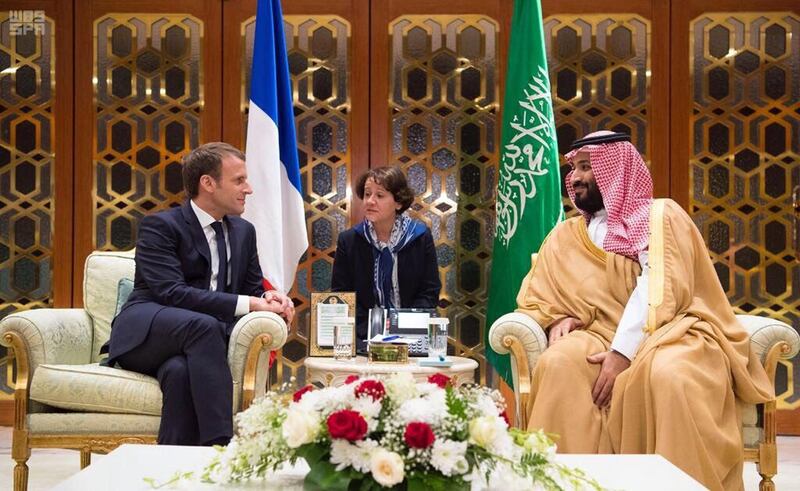France's hardened stance on Iran reflects a determination on the part of its president Emmanuel Macron to make clear that his differences with the United States do not make him a soft touch for Tehran.
The suspicions of the French administration about Iran's ballistic missile programme could hardly have been put more bluntly than in a foreign ministry statement last week.
Raising the threat of possible renewed sanctions against Iran - at odds with the position currently taken by France's European Union partners – an official talked of Tehran's role in destabilising and heightening insecurity in the Middle East.
This was a marked change from the views expressed by Mr Macron to the US president Donald Trump when he urged him not to wreck the deal on Iranian nuclear activity that ended international sanction against Iran.
In a telephone conversation in October, he warned Mr Trump against turning Iran into "another North Korea".
In an interview he gave Time magazine early in November, Mr Macron emphasised what he saw as the limits on room for manoeuvre.
Time, whose reporter met Mr Macron the eve of his visit to the UAE for opening of the Louvre museum in Abu Dhabi, quoted him as saying: "I just said, 'What is your other option? What do you want to propose?'
"If you want to stop any relation with Iran regarding nuclear activity, you will create a new North Korea. What's your other option? To launch war, to attack Iran? It would be crazy."
Despite that firm exchange, Mr Macron was already in agreement with Mr Trump on the importance of combating Iranian interference in the Middle East.
And the strident tone of France's intervention in the past few days highlights the way in which that has developed into a profoundly sterner outlook.
"France is concerned about the continued pace of the Iranian missile programme, which does not conform with Security Council Resolution 2231 and which is a source of destabilisation and insecurity for the region," the ministry's spokeswoman Agnes Romatet-Espagne said on Wednesday.
The message was reinforced by her references to the need for "frank and uncompromising dialogue", an investigation by the UN general secretariat and "if necessary new European sanctions against Iranian entities or individuals involved in the ballistic programme".
No familiarity with the nuances of diplomatic language was required to interpret the official's words as hostile to Iranian activities. As Paris intensified its verbal assault on Tehran, the foreign minister Jean-Yves Le Drian followed up on Thursday by condemning Iran's "hegemonic intentions".
Mr Macron himself added his personal authority to their remarks by stating on Friday his wish that Iran would adopt a "less aggressive regional strategy". While still intent on dialogue, he said, he was worried about "a ballistic policy that appears uncontrolled".
Iran was indignant at the toughened approach, twice within the space of 24 hours rebuking France in belligerent terms for supposedly poking its nose into internal affairs, an ironic position given the belief widespread among Iran's neighbours and beyond that Tehran has been meddling dangerously for some time.
Ali Akbar Velayati, international affairs adviser to Iran's supreme leader, Ali Khamenei, said on state television that his country would seek permission from no one on questions of defence and its ballistics progamme. "What has it to got to do with Macron?" he declared. "Who is he to interfere in these affairs?
"If he wants the relations between Iran and France to develop, he must try not to interfere in such cases, because it is against the national interests of France."
For the serious French daily newspaper Le Monde, the response showed clearly that a "war of words" had broken out between Paris and Tehran.
Mr Macron's comments preceded his meeting at the Elysee on Saturday with Saad Hariri, who cited Iranian interference in his statement explaining his resignation as Lebanese prime minister.
France has a long history of links with the Hariri family. A former French president, Jacques Chirac, was a close friend of Mr Hariri's father, Rafik, a former prime minister who was assassinated in a suicide attack in Beirut in 2005. Several supporters of the Iran-backed Hizbollah group are being tried by a UN-backed tribunal at The Hague in connection with the murder.
For diplomatic observers, the significance of another development has not been lost. Mr Le Drian, the French foreign minister, had been due to visit Tehran before the end of this month. That mission has been put back to a later date and not everyone takes the official line that the visit clashed with a busy schedule as telling quite the whole story.
Why Macron chose to toughen France's stance on Iran
The French president and his government have become highly critical of Tehran's missile programme and 'hegemonic intentions' in the Middle East

Editor's picks
More from the national





